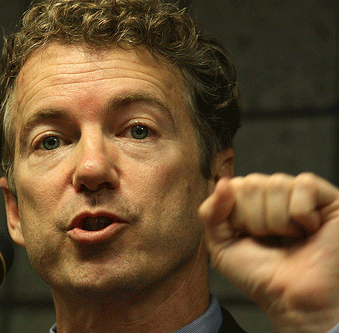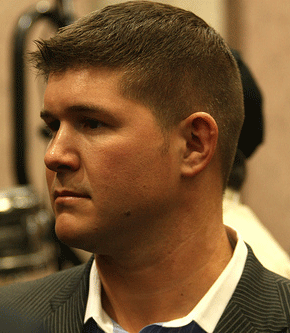
Rand Paul: Gage Skidmore; Zipper: Dyoma/iStockphoto
On a crowded Saturday in August at the Kentucky State Fair in Louisville, between vendors selling funnel cakes and Christian T-shirts, three volunteers manned a booth for Rand Paul’s Senate campaign. They smiled, waved, and seemed to be having a good time—until I stopped by and announced that I planned to hang out. “We can’t let you do that,” said one, who declined to give her name. So I talked to the only person who would give me the time of day—a woman in a wheelchair who had stopped by to grab a Paul bumper sticker. I asked her if she agreed with Paul’s stance that the Americans with Disabilities Act is an unfair burden to business owners. She looked to the volunteer for clarification, but now she, too, encountered the Paul campaign’s code of silence. “I can’t talk to you, ma’am,” the volunteer apologized. “I don’t want to mis-say something.”
Stalking jittery campaign workers certainly wasn’t how I’d hoped to cover Paul, who is seen as one of the tea-party-type Republicans most likely to capture a statewide seat this fall. But then, I didn’t have much choice: Paul, the son of libertarian stalwart Rep. Ron Paul (R-Texas), has gone to near-comic lengths to avoid what Sarah Palin calls the “lamestream media.” Everyone, from Paul and his top staffers to the lowliest door-knockers, has virtually stopped talking to reporters. The campaign did not return any of my phone calls requesting interviews over the course of three months. Even after I flew across the country and drove two hours to Paul’s busy campaign HQ in Bowling Green, I was politely turned away. “I’m sorry that I can’t be more helpful,” said a volunteer who avoided eye contact, seemingly shaken by the appearance of a live journalist. After myriad phone calls, I finally got one of Paul’s county-level campaign coordinators on the line, but he demurred: “It’s nothing to do with you; I just don’t do interviews, period.”
“I think everybody is very wary of being painted in a poor light,” explained Ginny Saville, assistant head of the Lexington Rand/Ron Paul Campaign for Liberty Meetup group and the only person even loosely affiliated with Paul who would agree to an interview. She worried that reporters like me might portray Paulites as “a bunch of gun-totin’, Bible-bangin’, anti-Semitic racists—all the things that are pinned on us a lot. I think everybody is very, very gun-shy of the media right now.”
Perhaps with good reason. Scott Lasley, a political science professor at Western Kentucky University and the GOP chair of Warren County (which includes Paul’s hometown of Bowling Green), told me that “you are just seeing a logical reaction to Paul’s catastrophic debut in the national media.” In May, Paul told the Louisville Courier-Journal that he thought the Civil Rights Act of 1964 trampled on private property rights, and he reiterated that view on the Rachel Maddow Show, prompting prominent Republicans to distance themselves from him. Going on Good Morning America to contain the controversy, Paul instead set off a new one by saying the rhetoric coming from Obama officials about BP “sounds really un-American.” Ever since, he has mostly limited himself to softball segments on Fox News. In August, he appeared briefly on Neil Cavuto’s Your World to tamp down a GQ story that he’d been part of a prank involving a college secret society, a blindfolded coed, bong hits, and an idol known as “Aqua Buddha.” Afterward, he was filmed fleeing the studio of the Kentucky Fox affiliate where he’d taped the segment as a reporter tried to ask him follow-up questions. (His Democratic opponent, Jack Conway, has since turned the Aqua Buddha story into an attack ad.)
Paul’s not alone in his media-free campaign strategy. After getting zinged for statements she’d made when she was a long-shot primary candidate, Nevada senatorial contender Sharron Angle stopped granting interviews to most local and national outlets. Joe Miller, the tea party senatorial candidate in Alaska, recently said he would not answer any media questions about his background; soon afterwards, his private security guards handcuffed and detained a journalist who tried to interview him. California gubernatorial candidate Meg Whitman, the former CEO of eBay, is the first statewide candidate to refuse to meet with the San Francisco Chronicle‘s editorial board in more than a decade. And Palin has barely spoken with any media besides Fox since her infamous interview with Katie Couric—without sacrificing her visibility or popularity. Similarly, Paul has called on the tea party to bypass the fourth estate by creating “another estate,” its own network of trusted blogs and websites. “We cannot let them”—the media—”characterize us,” he told a crowd at the Kentucky Freedom Festival in July.
Kentucky Secretary of State Trey Grayson, who had seemed like a shoo-in for the Senate seat before losing the GOP primary, told me that Paul can blow off the press now that the race is his to lose. (Conway, has been trailing in the polls.) Instead of wooing journalists, Paul has been focusing on his base, an odd and potentially volatile mix of libertarians, tea partiers, and independents.
Paul announced his candidacy at a meeting of Take Back Kentucky, an umbrella for many of the state’s tea party groups, in April 2009—a few days before he went to the media. TBK’s website notes that its libertarian and conservative members “disagree on many” issues but “have agreed to work together on several.” When I showed up at its monthly gathering at a Chinese restaurant in Elizabethtown, founder Norman Davis seemed to embody the coalition’s extremes. He told Phil Moffett, a Republican gubernatorial candidate, how to deal with the American-born children of illegal immigrants: “The parents need to be sent back to wherever they came from, and the child adopted out.” A few moments later, Davis griped that Kentucky should legalize “industrial hemp.”
Paul has tapped into libertarians’ and conservatives’ shared opposition to President Obama, federal spending, regulation, and taxes. But he’s also taken positions that middle-of-the road voters might find distasteful. He’s called Social Security a “Ponzi scheme” and wants to cut federal funding for drug enforcement and treatment. Likewise, by endorsing the Guantánamo detention center and condemning the proposed Muslim community center in Lower Manhattan, Paul has broken with his father’s libertarian stance.
So is Rand Paul a libertarian with tea-party tendencies, or a tea partier with libertarian impulses? With the candidate keeping mum, the answer is in the eye of the beholder. Some of Paul’s libertarian fans believe that his recent conservative shifts are just posturing. “I wouldn’t really support Rand if I didn’t think that he had a lot of the same beliefs as Ron,” says Alan Brown, a longtime Paulite from Bardstown. Not that he was going to mention that when he knocked on doors to ID likely voters.
Paul’s backers have become deeply skeptical of any information that doesn’t come directly from his campaign. “The media has a way of, let’s say, bending his words,” said a Paul fan with a Lincolnesque beard who was sitting next to me at the Country Ham Breakfast, an annual political tradition hosted at the state fair by the Kentucky Farm Bureau. On stage, Gov. Steve Beshear, a Democrat, slammed Paul for opposing farm subsidies and wanting to downsize the Department of Agriculture. “Anybody who really thinks that doesn’t know much about farming,” he proclaimed. Paul, who was not scheduled to speak, sat in the crowd.
Afterward, I scanned the cavernous convention hall for Paul, but he’d already slipped away. I headed back to the campaign booth with my video camera to see if someone—anyone—had something to say about the governor’s comments. The volunteer I approached said she wasn’t authorized to speak and tried to shoo me away. “This is ridiculous,” she protested. She reached for a large campaign sign and put it in between us, hiding behind the big block letters: “Rand Paul U.S. Senate 2010.”








